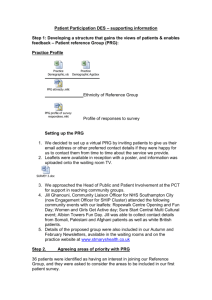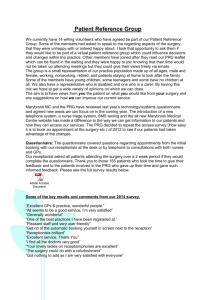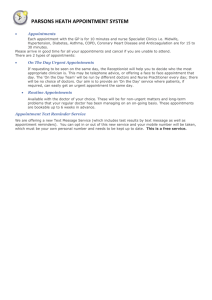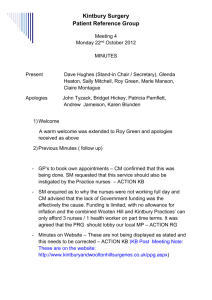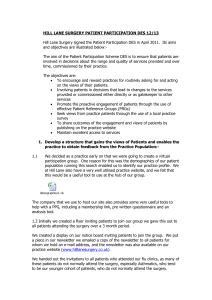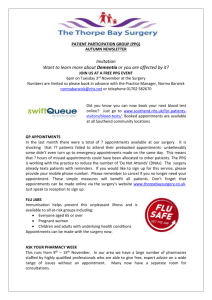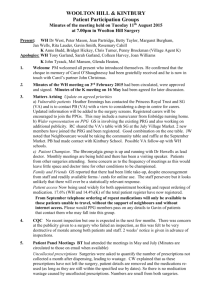STOURPORT HEALTH CENTRE MEDICAL PRACTICE
advertisement
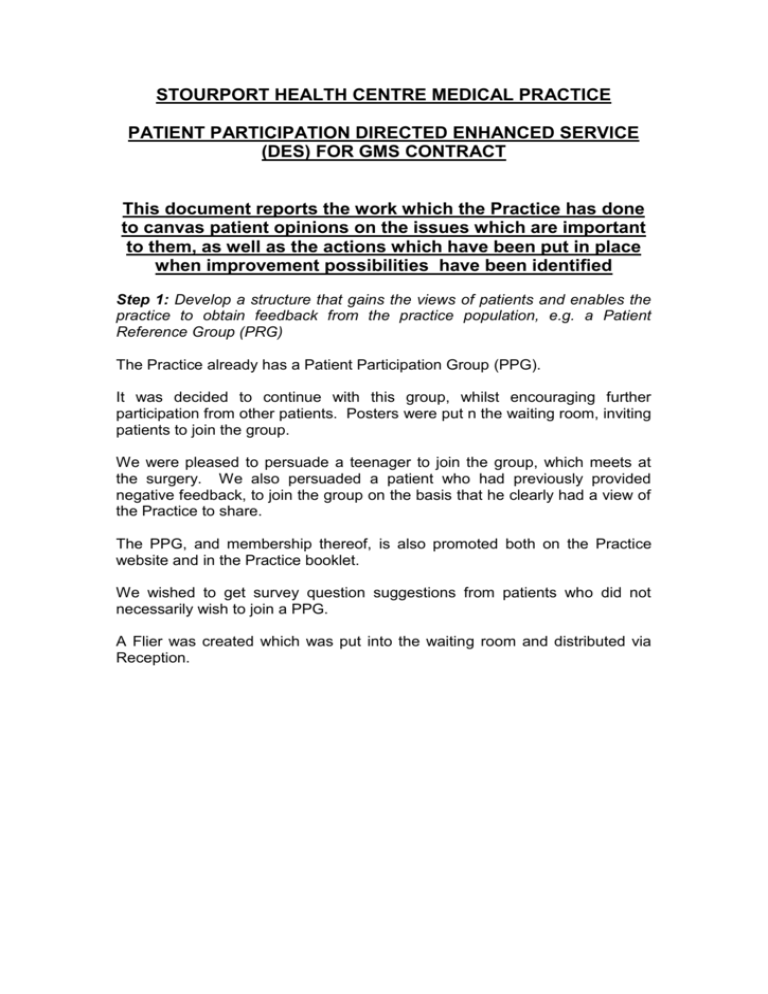
STOURPORT HEALTH CENTRE MEDICAL PRACTICE PATIENT PARTICIPATION DIRECTED ENHANCED SERVICE (DES) FOR GMS CONTRACT This document reports the work which the Practice has done to canvas patient opinions on the issues which are important to them, as well as the actions which have been put in place when improvement possibilities have been identified Step 1: Develop a structure that gains the views of patients and enables the practice to obtain feedback from the practice population, e.g. a Patient Reference Group (PRG) The Practice already has a Patient Participation Group (PPG). It was decided to continue with this group, whilst encouraging further participation from other patients. Posters were put n the waiting room, inviting patients to join the group. We were pleased to persuade a teenager to join the group, which meets at the surgery. We also persuaded a patient who had previously provided negative feedback, to join the group on the basis that he clearly had a view of the Practice to share. The PPG, and membership thereof, is also promoted both on the Practice website and in the Practice booklet. We wished to get survey question suggestions from patients who did not necessarily wish to join a PPG. A Flier was created which was put into the waiting room and distributed via Reception. Patients were encouraged to write their suggestions for questions for the survey on the flier. These fliers were promoted with posters in the waiting room. Patients were not particularly interested in offering questions. Patients had to be proactively approached in order to secure a question. In addition all patients who had supplied email addresses and / or mobile telephone numbers were contacted electronically. They too were invited to offer a question for inclusion in the Patient Survey. All suggestions were then collated. It was noted that a lot of patients, had used the fliers to write favourable comments on the slips, rather than offer questions. 30 Approximately 30 suggestion s for survey questions were received. Step 2: Agree areas of priority with the PRG. The PRG and the practice will shape areas covered by the local practice survey. A meeting was held of the PPG on 28 November 2011 at the surgery. Title headings for discussion included “Govt > electronic and in reception requests> responses received to date> what does the group think is important > patients’ priorities and issues> is GPAQ representative of this?” The proposed questions submitted by patients, for inclusion in the survey, were reviewed. The patient questionnaires devised by the Universities of Cambridge and Manchester, called GPAQ v2 and v3, were also discussed. The group felt that v2 was less user friendly in lay out. It was agreed that GPAQ v3 reflected the majority of the questions which patients had suggested. There were however 3 questions submitted by patients, relating to patients with special needs, parking and teenagers which the PPG felt was not been covered by the GPAQ questionnaire. It was therefore agreed to add these in as supplementary questions. The PPG agreed it was good to be able to “personalize” the survey in this way. The PPG also felt it was important that at every contact which the surgery has with patients, a check should be made to identify carers. It was therefore agreed to put some information relating to carer support at the end of the questionnaire. Step 3: Collate patient views through the use of survey. The practice must undertake a local practice survey at least once a year. The number of questions asked will be a matter for the PRG and the practice to decide but should be based on the priority areas they have identified. When the survey is complete the practice should inform its PRG of the findings. The Practice’s patient survey was run in January 2012. Questionnaires were offered to all patients attending the surgery to see a dr or nurse. The survey was also promoted on the Practice’s web site encouraging patients to complete a questionnaire. 153 questionnaires were completed. A spreadsheet was created in house and used to collate all the responses. There were up to 6 different responses available to the questions posed in the questionnaire. The split of answers for each question was scheduled out. This highlighted the respondents’ majority response to each question. It showed if there was a split or consensus of patient opinion against the questions asked. The age split of responses across the answer category was put into diagrammatical form for easy analysis. Step 4: Provide PRG with opportunity to discuss survey findings and reach agreement with the PRG on changes to services. A meeting was held with members of the PRG on March 9th 2012. The results of the patient survey were discussed. The results were shown in quantitative and graph format so that the spread of responses could be assessed. A computer projector was used so the group could all review the same results together. Each question and the responses received thereto , were discussed in turn. The PRG members were invited to say if they considered the responses in keeping with their view of the surgery. They were also encouraged to say if responses suggested a need for the Practice to alter its service provision or delivery Step 5: Agree action plan with the PRG and seek PRG agreement to implementing changes and where necessary inform the PCT. Question (in abbreviated Survey Resultform) most popular answer Helpful receptionists? 89% v helpful Action Required Easy to get through on the phone Easy to speak to dr/nurse on phone Can you be seen urgently on the day 53% very easy No 61% very/fairly easy 62% yes No Important to book ahead How easy to book ahead How do you book appts How you prefer to book 73% yes 89% very/fairly easy 73% by phone 65% by phone If you want to see a particular doctor How quickly usually can you be seen How is this rated 39% 2-4 days No 43% excellent or vg No 63% same or next day 67% excellent or vg 53% 5-10 minutes No 55% excellent or vg No If you want to see any doctor How quickly usually can you be seen How is this rated How long is wait for consultation to start How is this rated No- Comment- Yes No Yes – 100% should know can be seen urgently on the day – Patient Education though website, posters in reception No No No No –limited interest in online booking No Yes = 1 - ensure reception let pts know if clinician is running more than 20 minutes late 2- check if automatic late running messages can be incorporated into touch screen. Is practice open at a time convenient to you Which opening hours would make it easier for you to see/speak with some one Do you have a preferred GP How often do you see / speak with preferred GP How good was your GP you saw, last time at Giving you enough time Listening to you Explaining tests and Treatments Involving in decisions about your care 94% yes No 31% lunch No – this was only 12 responses 71% yes No – interesting that 3 in 10 do not mind who they see No Treating with care and concern Did you have confidence & trust in the GP How good was your nurse you saw last time at Giving you enough time Listening to you Explaining tests and Treatments Involving in decisions about your care Treating with care and concern Did you have confidence & trust in the nurse Thinking about the care you get from drs & nurses overall, how well are you helped to Understand your health problems Cope with your health problems Keep yourself healthy Describe your 41% always or almost always 76% very good 86% very good 93% very good No No No 74% very good 79% very good Yes – to highlight to drs that this indicator showed a slight drop compared to the other GP indicators No 89% yes definitely No 74% very good 68% very good 68% very good Yes – these results were judged harsh that the questions did not reflect the work which the nurses do. It was agreed to find questions more relevant to nurse work 62% very good 68% very good 85% very good No – this was felt a more accurate score 91% very well No 75% does not apply 82% very well 85% very good No No No experience of your surgery Would you recommend your surgery Is the parking satisfactory Are you a carer The survey results as a whole 96% yes definitely No 61% yes No 100% No Yes – with 153 replies it is very likely that some of the respondents will have been carers. But they are not identifying themselves as such. It was agreed to have a Carers day in September to promote the support which is available to carers and to encourage people to take up that support. This will be arranged with Worcestershire Association of Carers The group agreed with the outcomes of the survey. It was pleasing to see that when patients had the opportunity for anonymous feedback, that so little of the feedback was negative. It approved the actions discussed and agreed, and recommended the report be shared with patients and the wider Practice team Step 6: Publicise actions taken and subsequent achievement. A Patient Participation Report should be posted on the practice’s website You’re reading it! Further information on access to Clinicians at this surgery. Doctors’ morning surgeries run from 8.10 am to 12.15pm, and their evening surgeries run from 2.00 to 6.00pm. Nurses’ surgeries run each morning and afternoon. Some are general treatment room sessions, whilst others are designated for the treatment and management of specific conditions The Practice has also been contracted to provide approximately a further 4 hours of nurse and surgery time a week, outside of the usual practice open hours of 8am to 6.30pm. These appointments are intended to be of use to commuters, ie those not usually able to access our main surgery times. Emergencies and drop ins cannot be seen and will need to access the out of hours team in the usual way on 0300 123 321 1 Appointments may be made by telephoning 01299 827141 or by calling in person to the surgery. Routine appointments may be made up to 4 weeks in advance. The practice operates a computerised appointment system, which informs the doctor or nurse of your arrival; it is very important you ensure the reception staff know you have arrived. We ask you to attend appointments on time or give the practice adequate notice if you wish to cancel. Cancelled appointments can be re-allocated, whereas appointments where patients fail to turn up, are wasted. We monitor those patients who make appointments and fail to attend. Persistent abuse of the appointments system cannot be tolerated, for the sake of all our patients. If following warnings from the Practice, a patients continues failing to attend for booked appointments, then the Practice reserves the right to remove the patient from the Practice list and ask them to find another doctor. Patients who arrive late for appointments may, at the discretion of the surgery, be asked to make an alternative one. Ringing to advise the Practice that you are running late, does not alter this. This is because the allocated time has been missed and the clinician will be consulting other patients. If it is an urgent problem then patients will be seen but may have to wait until the end of the session. Sometimes patients may also have to wait past their appointment to be seen, if the clinician has had a particularly busy surgery. We will always aim to keep patients informed when the doctor or nurse is running late, and ask for your patience when this happens. An appointment is for one person only; where another member of the family needs to be seen or discussed, another appointment should be made. Patients may bring a friend or relative to accompany them at their consultation if they wish. Dr Ward is a qualified GP trainer and so this Practice undertakes the teaching of health care professionals. Patients may be asked if a consultation can be videoed or if a student can observe. If you prefer, you may choose not to participate in the training and your consultation and care will not be affected. It is useful to think about what you want to discuss with the doctor or nurse. Appointments however are time limited and you may need more than one appointment to complete your discussions. A routine appointment is 10 minutes long. Chaperones are available for personal or intimate examinations, if the patient requests it. Consultation with the Nurse As with the doctors, the nurses operate an appointment system. We cannot accommodate people who ‘drop in’ hoping to be seen. Minor injuries should be dealt with by the minor injuries unit based at Kidderminster Hospital; this is at weekend and night time as well as during the weekday; the surgery does not offer an ‘emergency service’ for bumps, cuts, foreign bodies etc. Weekend and Night Cover The Practice will provide your primary medical care from 8am until 6.30pm from Monday to Friday. Outside of these hours (e.g. night time, weekends and bank holidays) NHS Worcestershire will be responsible for providing Out of Hours Care. There will occasional pre-booked only appointments available on a Saturday at the Health Centre. To contact a doctor for medical problems when the surgery is closed, Please ring 0300 1233211 This number is also given on our answer machine, which is switched on when the surgery is closed
